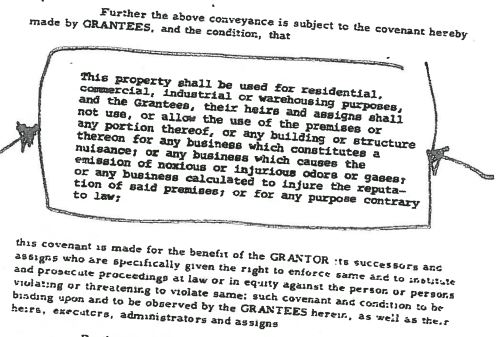Strip club shot down by Planning Commission
Monday, October 26, 2015 by
Elizabeth Pagano Plans to build a strip club at Ben White and I-35 hit a bump at the Planning Commission, where a “morals clause” in a private restrictive covenant gave some commissioners pause.
Commissioners denied the zoning change in a vote of 9-1-1, with Commissioner Jose Vela voting in opposition and Commissioner James Schissler abstaining.
For 31 years, the property at 4222 S. I-35 was home to a Furr’s cafeteria, which now sits vacant. BIKS Inc. is seeking a zoning change from Limited Industrial Services (LI) to General Commercial Services (CS-1) in order to open an “adult lounge” – also known as a strip club that serves alcohol. In order to actually open the lounge, the owners would need to obtain a Conditional Use Permit in addition to getting the zoning change.
There is currently a restrictive covenant on the property, which was once owned by St. Edward’s University. Though there is a provision in the covenant that restricts nuisances on the land, it’s unclear whether that provision applies to the current application, and staff steered clear of offering an opinion about that.
Instead, commissioners were left to their own devices in interpreting a provision that prohibits use of the property “calculated to injure the reputation” of the property.
They were also asked to use their own discretion about whether to factor the restrictive covenant into their decision at all. Because it is a covenant between two private parties and the city is not involved, commissioners can choose to weigh its contents if they wish but are under no obligation to do so. City staff does take private restrictive covenants into consideration in some cases – when land is being rezoned from residential to commercial – but that was not the case in this instance.
Phil Moncada is the registered agent for the project, and he clarified that the city has no legal standing in a private restrictive covenant. He also said that he didn’t think that a strip club violated the covenant because “the only people who can come into an adult-oriented business are adults. So the only reputation you might sully is your own.
“Times have changed significantly,” Moncada continued. “The pope visiting Cuba, visiting the United States, his stance on changing his perspective on very strict beliefs – it’s changing, just like everything else has to change.”
Though there was some discussion among commissioners about whether they might grant the zoning and worry about the adult use when the CUP came before them, Commissioner Trinity White pointed out that the only difference between the existing and proposed zoning was that the new zoning allows adult-oriented businesses, pawn shops, liquor sales and educational uses.
White said that by changing the zoning, regardless of the proposed conditional overlay, the commission was “setting the train in that direction.”
“It seems clear to me that with the restrictive covenant, (the) intention is not to have this type of business on that site, and I feel like that should be respected,” said White.
On the other hand, Vela questioned why the Planning Commission was giving any due to a private restrictive covenant, saying they had “kind of an ugly history.”
“If the landowners around there want to sue and try to enforce a restrictive covenant, especially one that’s as poorly and vaguely worded as this one, they’re free to do that,” said Vela. “We need to set the zoning. … We have no obligation to respect the restrictive covenant whatsoever.”
The restrictive covenant is between the property and two hotels, and the now-vacant lot that was formerly Howdy Honda. Though Moncada questioned their reasons for opposing the rezoning and suggested that the opposition was based on “competition,” two opponents clarified the reasoning behind their opposition to the commission.
Mitchell Whiddon, who owns land nearby, specifically cited the St. Elmo Market and a nearby office project in the works as what could help build a “landmark new area” in the city. He urged commissioners to use common sense when interpreting the restrictive covenant.
“This has been an underutilized and kind of blighted area for a long time. But it’s got some really amazing, dynamic things that are happening there,” said Whiddon. “I think this is the wrong use for this property, and I think that it would be deleterious to the area and what is happening there.”
Commissioner Nuria Zaragoza agreed that the St. Elmo’s rezoning was a “huge case” and that changing that zoning from industrial to allow residential, office and entertainment uses “created a view for that area, and those industrial sites.”
Stephanie Evans, who is the general manager of the Candlewood Suites next door to the proposed adult lounge, also spoke against the plan. She explained that the hotel’s two target markets are families and people relocating to Austin and that the lounge posed a safety concern for guests in addition to concerns about “guest feedback.”
Commissioner Tom Nuckols said he sympathized with the plight of the hotel and envisioned a bleak, downward-spiraling future for the hotel if a strip club were to be built next door.
Restrictive covenant snippet courtesy of the city of Austin.
You're a community leader
And we’re honored you look to us for serious, in-depth news. You know a strong community needs local and dedicated watchdog reporting. We’re here for you and that won’t change. Now will you take the powerful next step and support our nonprofit news organization?






